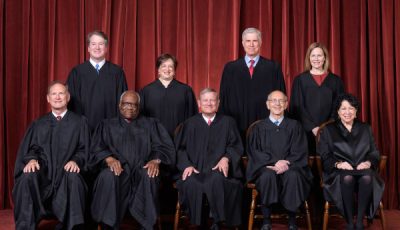Utah’s Porn Filtering, Online Speech Proposals Are Unconstitutional
 SALT LAKE CITY — Utah’s state legislature ended its annual session, recently. YNOT has covered, extensively, the evolution of House Bill (HB) 72 — a proposal that would mandate every single mobile phone and tablet sold in Utah to come preinstalled with porn filtering software as a default operating system option.
SALT LAKE CITY — Utah’s state legislature ended its annual session, recently. YNOT has covered, extensively, the evolution of House Bill (HB) 72 — a proposal that would mandate every single mobile phone and tablet sold in Utah to come preinstalled with porn filtering software as a default operating system option.
Rep. Susan Pulsipher, R-South Jordan, introduced HB 72 and initially faced opposition from Republicans because the initial outline of the bill wasn’t suitable for certain conservatives in the House. However, a substitute version of House Bill 72 made it through the House and the Senate with the support of a Republican supermajority that relies on social conservatism augmented by the Church of Jesus Christ of Latter-day Saints and its anti-porn and anti-freedom positions. The bill, in fact, passed quickly over the span of a weekend and now sits on the desk of Republican Gov. Spencer Cox. According to the Associated Press (via the Salt Lake Tribune), Pulsipher said that the bill is supposedly a “boon to parents.” That said, the critics of the bill question the motives behind the HB 72 and consider whether it’s workable or even constitutional.
If Cox signs the bill into law, it’s going to have far-reaching implications for free speech.
Senate Bill (SB) 228 also made it to the governor’s desk. SB 228 is a so-called free speech protection bill intended to hold social media platforms accountable for repressing conservative viewpoints online. Republican Sen. Michael K. McKell introduced the bill, and it passed the legislature along the slimmest of margins. SB 228 grants recourse for Utah web users who feel that they have been treated unfairly by a social media website or moderated web platform. Users who feel as if they were treated unfairly can issue a complaint to the Utah Division of Consumer Protection, who can later refer the matter to Attorney General Sean Reyes. The bill also provides a legal mechanism for the attorney general’s office to take up civil action against a social media company that could result in a penalty of $1,000 per consumer impacted by the moderation action that was taken by the said company.
To simplify this, Senate Bill 228 designs an entirely new regulatory framework for social media and interactive computer services. HB 72 builds on the design of SB 228 to offer the Utah state government a plethora of new tools to quash virtually any form of constitutionally-protected speech that it deems harmful. Both bills, if they do become law and enter into force, also attempt to defang the third-party liability shield for platforms outlined in Section 230 of the Communications Decency Act (CDA) of 1996. This could lead to a constitutional crisis that impacts more than Utah and the supremacy of the federal government. The underlying case law provides justification to argue that SB 228, HB 72, and other proposed social media and internet regulatory bills brought forth in dozens of state and territorial legislatures are essentially unconstitutional based on a variety of factors. Most importantly, case law doesn’t justify the intent of the proposed bills.
The United States Supreme Court ruled in a benchmark case, Reno v. American Civil Liberties Union, that the anti-indecency provisions implemented by CDA violated the First Amendment’s guarantee of freedom of speech as it relates to the internet. For background, the Communications Decency Act of 1996 made it a federal crime for anyone engaged in online speech that is considered “indecent” or “patently offensive” if the speech could be or is viewed by a minor. However, the ACLU successfully argued that the censorship provisions in the CDA were unconstitutional because it would criminalize expression and speech protected by the First Amendment. This sort of speech includes porn. The high court basically repealed the 1996 law in its entirety, leaving Section 230 in place and offering the legal incentive for web platforms of all types to self-regulate as well as they can. Other rulings abound in state and federal courts.
Utah lawmakers should be more cognizant of existing precedent before introducing bills like HB 72 and SB 228. Like many other states, Utah is a case study of how far state governments will be permitted to go with these tech intervention proposals. All these bills, of course, come from Republicans and Democrats who are anti-tech and likely misunderstand how free speech and expression on the internet works. As it pertains to obscenity, the Supreme Court has ruled numerous times that nudity itself doesn’t constitute an “obscene” depiction. Nor does it mean that Congress and states can implement laws and regulations that inherently censor speech one may view as obscene, but is protected by the First Amendment. Unless the content in question is found to fail the Miller Test, any argument suggesting that consensually produced, legal porn is obscene and violates the First Amendment fails. This includes attempts by state legislatures looking to regulate speech they deem as obscene or hurtful, regardless of it being an OnlyFans model specializing in fetish content or a controversial social media influencer who circulated content the platform deems as a violation of its terms of service.
Unfortunately, the topics described above are often misunderstood and that, in itself, is a dangerous thing to deal with in a virtual world. Politicians in Utah really need to reconsider the bills discussed here and the whole moral crusade against porn and naughty things. This also goes for the others in states considering similar unconstitutional proposals. Instead of listening to their like-minded pastors in the political echo-chambers in their hometowns, some of these lawmakers should read a few court rulings.
You don’t have to like porn. Hell, you can even be a super religious person. But, the First Amendment covers a person’s right to practice their faith and spiritual beliefs while also granting a person’s right to perform and distribute consensual NSFW content on the internet. It applies to both, and there needs to be an understanding of that truth. And, for some, a hard truth (no pun intended) that there is more to the world than one’s own, single-minded beliefs.
Remember, that “marketplace of ideas” hullabaloo that the kids talk about these days? You know, those damn youngins with their ‘Snapchats’ and their Minecraft thingamajigs….
Computer screen photo by Designecologist from Pexels













